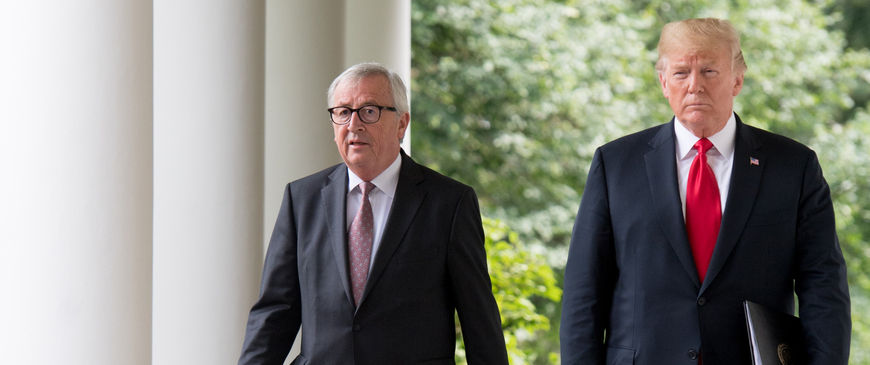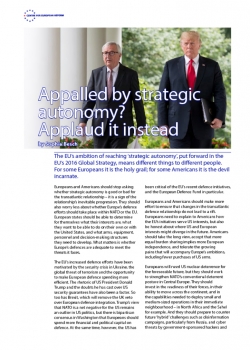
Appalled by strategic autonomy? Applaud it instead
Strategic autonomy is a sign of the transatlantic relationship’s inevitable progression. Europeans and Americans need to manage the growing pains that will accompany Europe’s ambitions.
The EU’s ambition of reaching ‘strategic autonomy’, put forward in the EU’s 2016 Global Strategy, means different things to different people. For some Europeans it is the holy grail; for some Americans it is the devil incarnate.
Europeans and Americans should stop asking whether strategic autonomy is good or bad for the transatlantic relationship – it is a sign of the relationship’s inevitable progression. They should also worry less about whether Europe’s defence efforts should take place within NATO or the EU. European states should be able to determine for themselves what their interests are, what they want to be able to do on their own or with the United States, and what arms, equipment, personnel and decision-making structures they need to develop. What matters is whether Europe’s defences are adequate to meet the threats it faces.
Europeans and Americans should stop asking whether strategic autonomy is good or bad for the transatlantic relationship – it is a sign of the relationship’s inevitable progression.
The EU’s increased defence efforts have been motivated by the security crisis in Ukraine, the global threat of terrorism and the opportunity to make European defence spending more efficient. The rhetoric of US President Donald Trump and the doubts he has cast over US security guarantees have also been a factor. So too has Brexit, which will remove the UK veto over European defence integration. Trump’s view that NATO is a net negative for the US remains an outlier in US politics, but there is bipartisan consensus in Washington that Europeans should spend more financial and political capital on defence. At the same time, however, the US has been critical of the EU’s recent defence initiatives, and the European Defence Fund in particular.
Europeans and Americans should make more effort to ensure that changes in the transatlantic defence relationship do not lead to a rift. Europeans need to explain to Americans how the EU’s initiatives serve US interests, but also be honest about where US and European interests might diverge in the future. Americans should take the long view, accept that more equal burden sharing implies more European independence, and tolerate the growing pains that will accompany Europe’s ambitions, including fewer purchases of US arms.
Europeans will need US nuclear deterrence for the foreseeable future, but they should work to strengthen NATO’s conventional deterrent posture in Central Europe. They should invest in the readiness of their forces, in their ability to move across the continent, and in the capabilities needed to deploy small and medium-sized operations in their immediate neighbourhood – in North Africa and the Sahel for example. And they should prepare to counter future ‘hybrid’ challenges such as disinformation campaigns, particularly from Russia, and cyber threats by government-sponsored hackers and other groups. The EU can play a crucial role: as a regulatory power, the Union can raise standards of cyber security and preparedness among its member-states. It will also play a vital part in easing the passage of military equipment across member-states’ borders and in ensuring that EU investment in transport infrastructure is compatible with military needs. Through programmes like the European Defence Fund, the Commission can help to consolidate the European defence market by providing financial incentives for co-operative, cross-border arms development projects. In order to reach these objectives, the EU has to become more pragmatic in how it works with strategic partners, such as a post-Brexit UK.
Critics of strategic autonomy make much of the risk of duplication between the EU and NATO. It is true that Europeans will have to make sure that, for example, NATO’s planning process and the EU’s new co-ordinated annual defence review are joined up. But – perhaps predictably – the main disagreements between Americans and Europeans currently concern defence industrial interests. The European Commission has put forward regulations that could make it difficult for defence firms owned by third countries to participate in the development of European capability projects co-funded by the EU. The Union maintains that this type of co-operation should only happen exceptionally, when the country in which the firms are based has an administrative agreement with the European Defence Agency (the US does not have one), and only under restrictive intellectual property rights rules.
The US is not the only country that has an issue with the Commission’s proposals. The UK firmly opposes them, and even EU member-states like Finland, Sweden and the Netherlands think the Commission has come down too firmly on the side of favouring European companies. These countries are calling for a more open approach. The defence fund planned for the next EU budget is the Commission’s first foray into defence investment. The EU will learn by trial and error how to balance support for European defence firms with getting the best equipment for its money, not least through industry feedback on the initiative.
Europeans need to prove that EU defence initiatives will create a stronger partner for the US, rather than just helping European defence industries win market share from American firms.
Europeans need to show that their defence efforts yield results in operations. They also need to prove that EU defence initiatives will create a stronger partner for the US, rather than just helping European defence industries win market share from American firms. For their part, Americans should acknowledge that an integrated European defence industry, combined with a common European defence strategy, should lead to a fairer distribution of the transatlantic security burdens.
Sophia Besch is a research fellow at the Centre for European Reform.

